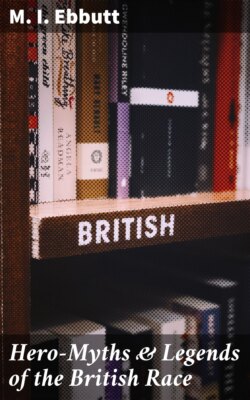Читать книгу Hero-Myths & Legends of the British Race - M. I. Ebbutt - Страница 21
На сайте Литреса книга снята с продажи.
Beowulf Faces Death
ОглавлениеTable of Contents
When the little party reached the place they halted for a time, and Beowulf sat down meditating sadly on his past life, and on the chances of this great conflict which he was about to begin. When he had striven with Grendel, when he had fought against the Hetware, he had been confident of victory and full of joyous self-reliance, but now things were changed. Beowulf was an old man, and there hung over him a sad foreboding that this would be his last fight, and that he would rid the land of no more monsters. Wyrd seemed to threaten him, and a sense of coming woe lay heavy on his heart as he spoke to his little troop: “Many great fights I had in my youth. How well I remember them all! I was only seven years old when King Hrethel took me to bring up, and loved me as dearly as his own sons, Herebeald, Hathcyn, or my own dear lord Hygelac. Great was our grief when Hathcyn, hunting in the forest, slew all unwittingly his elder brother: greater than ordinary sorrow, because we could not avenge him on the murderer! It would have given no joy to Hrethel to see his second son killed disgracefully as a murderer! So we endured the pain till King Hrethel died, borne down by his bitter loss, and I wept for my protector, my kinsman. Then Hathcyn died also, slain by the Swedes, and my dear lord Hygelac came to the throne: he was gracious to me, a giver of weapons, a generous distributor of treasure, and I repaid him as much as I could in battle against his foes. Daghrefn, the Frankish warrior who slew my king, I sent to his doom with my deadly hand-grip: he, at least, should not show my lord’s armour as trophy of his prowess. But this fight is different: here I must use both point and edge, as I was not wont in my youth: but here too will I, old though I be, work deeds of valour. I will not give way the space of one foot, but will meet him here in his own abode and make all my boasting good. Abide ye here, ye warriors, for this is not your expedition, nor the work of any man but me alone; wait till ye know which is triumphant, for I will win the gold and save my people, or death shall take me.” So saying he raised his great shield, and, unaccompanied, set his face to the dark entrance, where a stream, boiling with strange heat, flowed forth from the cave; so hot was the air that he stood, unable to advance far for the suffocating steam and smoke. Angered by his impotence, Beowulf raised his voice and shouted a furious defiance to the awesome guardian of the barrow. Thus aroused, the dragon sprang up, roaring hideously and flapping his glowing wings together; out from the recesses of the barrow came his fiery breath, and then followed the terrible beast himself. Coiling and writhing he came, with head raised, and scales of burnished blue and green, glowing with inner heat; from his nostrils rushed two streams of fiery breath, and his flaming eyes shot flashes of consuming fire. He half flew, half sprang at Beowulf. But the hero did not retreat one step. His bright sword flashed in the air as he wounded the beast, but not mortally, striking a mighty blow on his scaly head. The guardian of the hoard writhed and was stunned for a moment, and then sprang at Beowulf, sending forth so dense a cloud of flaming breath that the hero stood in a mist of fire. So terrible was the heat that the iron shield glowed red-hot and the ring-mail on the hero’s limbs seared him as a furnace, and his breast swelled with the keen pain: so terrible was the fiery cloud that the Geats, seated some distance away, turned and fled, seeking the cool shelter of the neighbouring woods, and left their heroic lord to suffer and die alone.
